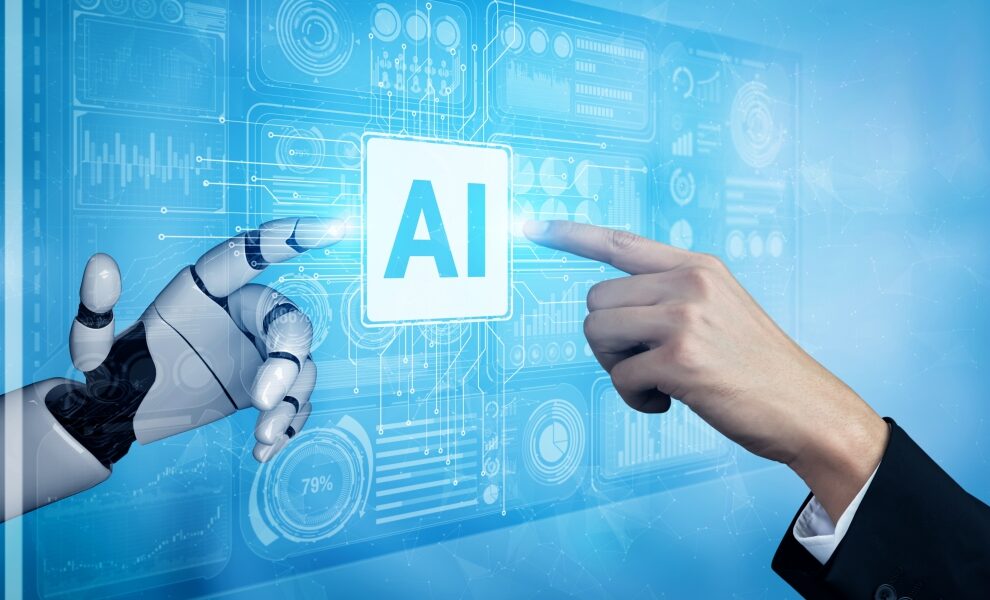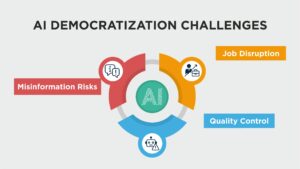Long ago, artificial intelligence was only used by big tech companies and researchers. It was afforded by big tech giants only, but now, whether it be a small-scale company, big business, or individual, everyone is able to use powerful tools like AI. This is possible because of AI democratization. This shift is reshaping the way we live, work, and innovate.
In this blog, we will explore what democratization of AI is, why it matters, and how it is making technology more inclusive without complexity.
What is AI Democratization?
AI democratization makes AI tools and knowledge accessible to everyone. Now, it is no longer limited to tech giants. A decade ago, building an AI model required expensive servers, coding expertise, and massive datasets. But democratization of AI has made it simple as no-codes, cloud platforms, and open-source software allow even non-experts to use AI.
Key drivers behind this change are:
- Cloud computing: Cheaper, on-demand processing power.
- Pre-trained AI models: Ready-to-use solutions.
- No-code platforms: Drag-and-drop tools.
This shift is like giving everyone a superpower, which was previously limited to a few.
Why AI Democratization Matters?
1. Leveling the Playing Field
Small businesses can now compete with corporations. For example,
- A local bakery uses AI-powered chatbots for customer service.
- Farmers analyze crop health with free satellite imaging tools.
Without democratization of AI, only wealthy companies could afford these advantages.
2. Enhancing Education and Innovation
Students and researchers around the world can now access AI tools for free or at a low cost. Platforms like Google Colab and Kaggle provide free computing resources, allowing learners to experiment without needing expensive hardware.
3. Solving Real-World Problem Faster
When more people use AI, solutions come faster. During the pandemic, open-source AI models helped track outbreaks, optimize vaccine distribution, and analyze research papers quickly.
How AI Democratization is Changing Industries?
Healthcare: Better Diagnoses for All
AI tools like IBM Watson Health and Google’s DeepMind assist doctors in detecting diseases early. Now, even clinics in remote areas can use smartphone apps to scan X-rays or predict patient risks.
Agriculture: Smarter Farming
Farmers in developing countries use AI-powered apps to monitor soil quality, predict the weather, and detect pests. These tools were once out of reach but are now as simple as using a mobile app.
Small Businesses: Competing with Giants
AI-powered marketing tools (like ChatGPT for content or Canva’s design AI) help small businesses create professional campaigns without hiring experts.
Challenges of AI Democratization
AI access is good but not perfect:
- Misinformation Risks: Easy-to-use AI can also generate fake content or deepfakes.
- Job Disruption: Automation may replace some roles, requiring workforce reskilling.
- Quality Control: Not all democratized AI tools are reliable. There are some which give poor results.
The Future: What’s Next for AI Democratization?
The trend is growing rapidly, soon we may see:
- AI in everyday apps (like email, calendars, and social media).
- More local-language AI tools for non-English speakers.
- Ethical AI framework to make sure of transparency and fairness.
The goal will be a world where anyone, anywhere, can use AI to improve their lives.
Final Thoughts
AI democratization is more than just technology. It is about creating opportunities. By making AI tools affordable and easy to use, we are unlocking creativity, innovation, and problem-solving for everyone around the world. Whether you are a student, entrepreneur, or tech enthusiast, AI is now within your reach. The big question is, how will you use it? When everyone has access to technology, the possibilities are endless.
To learn more, visit HiTechNectar!
FAQ
Q1. Are there risks to making AI widely available?
Answer: Yes, it is quite risky to make AI widely available as it may create data privacy concerns, job market changes, and spread misinformation.
Q2. How does a non-tech expert start using AI?
Answer: Start with user-friendly platforms like Canva (for design), ChatGPT (for writing), or Google’s AI tools (for data analysis). As to use AI it is not necessary you should know code.
Q3. Who benefits more from AI democratization?
Answer: Small businesses, educators, healthcare workers, and individuals benefit the most. AI tools help them to compete, learn, and solve problems without needing expensive resources.
Also Read:
How Low-Code and No-Code Platforms Are Changing Software Development
What Is a Generative Model? Unlocking The Future of Creative Machine Learning



